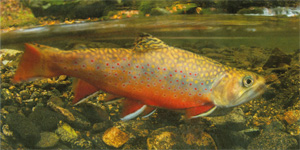
The Santuit River in Mashpee has suffered a long history of degradation, from dams in the early 1600s to cranberry bogs in the 1800s and on to more complex influences in the 20th Century. Our more recent impacts have included pesticides, herbicides and fertilizers, all compunded by significant water withdrawl due to increased development. Chemicals of Emerging Environmental Concern (CEECs) include hormone disrupting elements found in medications, personal hygiene products and household chemicals have led to lower fertility and altered reproductive rhytms. The final result of all of this has only recently come to our attention, the loss of the native sea run brook trout strain unique to the Santuit.
Steve Hurley, Fisheries Manager for the Souteast District of MA FnW, has been out on two separate occassions to electrofish for trout in the Santuit and has come up empty handed both times. This was hugely disappointing because "The Santuit River was one of the three streams on Cape Cod with intact and self sustaining, stream specific, salter brook trout populations" (Winders). "Well-intended" removal of woody debris to increase herring runs may have been the last straw as this cover is so essential for trout food and habitat and thus trout survival. The few remaining rivers along our coast with searun brook trout populations are critical gene banks to keep open options in future management decisions.
Though this paints a bleak picture for the Santuit, there is the remote chance that a few of these trout are surviving out in our bays and will return to prove us wrong. Though not very likely, we need to recognize the significance of this news and and get involved to preserve what we still currently have.
To take action, get involved with and support
The Sea Run Brook Trout Coalition
. You can learn a whole lot from their website.
To learn more about chemical concerns in the environment see
The Silent Spring Institute
and for more Cape oriented information see
Greencape
.
|
Act H.3690 - Kinder Morgan Tenn. Gas Pipeline Easement in Sandisfield, MA

This bill will lead to the taking of protection from public land in Otis State Forest and Spectacle Pond Farm to allow passage of a natural gas pipeline. Kinder Morgan Tennessee Gas Pipelineâs two current proposals endanger over 100 conservation parcels, at least 86 of which are protected by Article 97 of the Massachusetts Constitution.
There is a public hearing next Thursday, November 10th in Boston on
House Bill 3690
(I think Section 9 is the source of the problem) which would strip the protected status (Article 97 of the amended Massachusetts Constitution) from land in Otis State Forest, including old growth forest, to allow for the construction of a pipeline spur to provide natural gas to Connecticut. This legislation represents the âcamelâs nose under the tentâ when it comes to NED. If H. 3690 is approved, it increases the likelihood that similar legislation will ultimately be approved to strip Article 97 protection from thousands of acres of additional protected open space to facilitate the construction of NED.
Please show up to show your voice of opposition to this legislation as it sets a precedent which will only help Kinder Morgan's attemtps to build a much longer pipeline through some beautiful habitats of western Mass.
General Schedule
-
10AM Rally at the Grand Staircase
-
11AM Bill Hearing for protecting lands from Pipelines in the Gardner Auditorium
-
(Anytime between 11AM - 1PM Faith Meetings with Legislators)
|